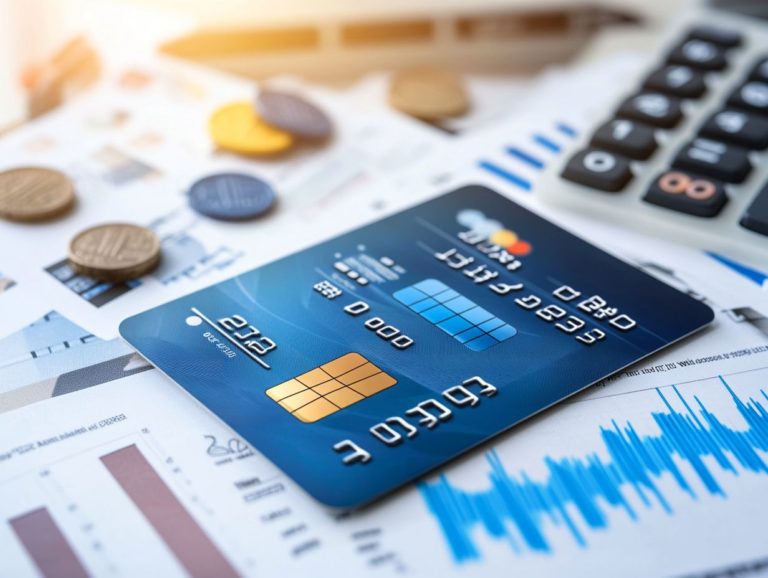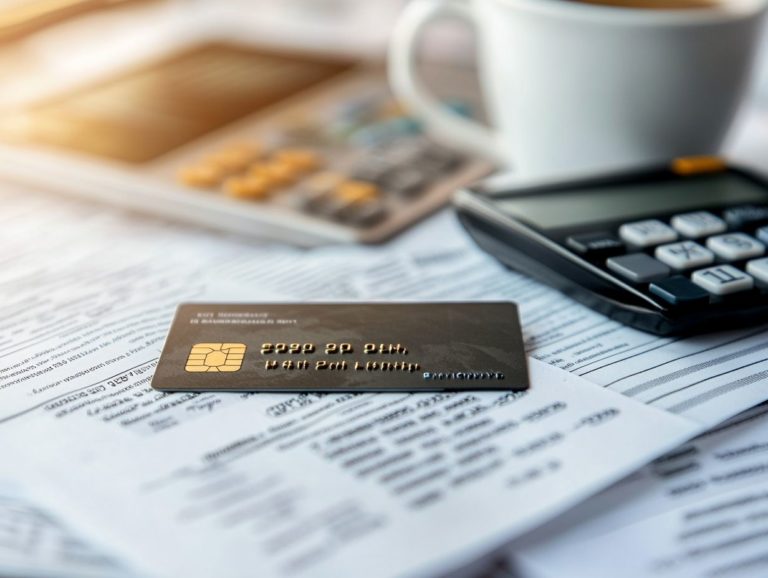What is a Secured Credit Card?
Secured credit cards are invaluable resources for anyone aiming to build or repair their credit. Unlike traditional credit cards, secured options necessitate a cash deposit that serves as collateral, making them accessible to individuals with limited or damaged credit histories.
This guide delves into the essentials of secured credit cards, exploring how they function, their advantages, potential drawbacks, and alternatives. Whether you’re embarking on your credit journey or striving to enhance your score, grasping the intricacies of secured credit cards is essential.
Contents
- Key Takeaways:
- Understanding Secured Credit Cards
- How Do Secured Credit Cards Work?
- Why Secured Credit Cards Are Great!
- Potential Drawbacks of Secured Credit Cards
- Alternatives to Secured Credit Cards
- Frequently Asked Questions
- What is a Secured Credit Card?
- How does a Secured Credit Card work?
- Who is eligible for a Secured Credit Card?
- What are the benefits of using a Secured Credit Card?
- What is the difference between a Secured Credit Card and an Unsecured Credit Card?
- Can I get my security deposit back when I close my Secured Credit Card?
Key Takeaways:

- A secured credit card is a credit card that requires a cash deposit to secure a line of credit and is typically used to build or improve credit.
- Eligibility for a secured credit card is based on the ability to make a cash deposit, and the approval process varies by issuer. Responsible use of a secured card can lead to an improved credit score.
- Using a secured credit card and making timely payments can help improve your credit score. Some cards offer additional perks and benefits such as cashback and fraud protection.
Understanding Secured Credit Cards
Secured credit cards are helpful financial tools for those looking to build or rebuild their credit history, especially if you’re navigating a low credit score or stepping into the world of credit for the first time.
Unlike traditional credit cards, a secured card necessitates a cash deposit that acts as collateral. This setup gives you the power to manage how much credit you use and your payment history responsibly. It paves the way for enhanced creditworthiness and opens doors to unsecured credit options down the line.
How Do Secured Credit Cards Work?
Secured credit cards operate by having you submit a credit application along with a security deposit. This deposit not only dictates your credit limit but also plays a key role in determining your eligibility for approval.
Eligibility and Approval Process
Eligibility for a secured credit card typically relies on completing a credit application, which card issuers meticulously review to assess your ability to fulfill financial obligations, even if your credit score is on the lower side.
Beyond the application, you ll often need to provide documentation such as proof of income, identification, and residence. This information helps paint a clearer picture of your financial stability. Card issuers carefully evaluate factors like how much money you owe compared to how much you earn and existing debts to understand potential risks. A steady income stream can work in your favor during the approval process, while an unstable financial history might raise some red flags.
The size of your security deposit also plays a significant role, as it directly influences your credit limits and demonstrates your commitment to responsible credit management.
Using and Building Credit with a Secured Card
Using a secured credit card can truly be a game changer for you as you work on building your credit. It s all about making those timely monthly payments and keeping your usage low.
To unlock the full potential of a secured card, it’s essential for you to embrace strategies that foster fiscal responsibility. Setting up automatic payments can take the stress out of missed deadlines, ensuring your payments are consistently on point. Using payment alerts can help you remember to make on-time payments.
Establishing a solid payment history is vital, as it plays a significant role in influencing your credit score over time. When you pair this with responsible credit usage aiming to keep your balances below 30% of your credit limit you ll enhance your credit profile and set the stage for a more favorable credit history down the road.
Why Secured Credit Cards Are Great!

Secured credit cards offer amazing benefits that can boost your credit score, access valuable cardholder perks like cash back rewards, and help you build a robust credit history.
Ready to take control of your credit? Dive into the world of secured credit cards today!
Improving Credit Score
One of the primary advantages of using a secured credit card is its remarkable ability to enhance your credit score through consistent and responsible financial habits, such as making timely payments.
By committing to regular, on-time payments, you can establish a positive payment history, which is a significant portion of your credit score. Over time, this responsible usage builds trust with creditors and demonstrates your financial reliability. As your scores improve, you may find yourself more eligible for unsecured credit options in the future.
This pathway opens up greater financial flexibility and potentially better interest rates, enriching your overall financial opportunities. In essence, secured credit cards act as a valuable stepping stone toward achieving long-term credit health.
Additional Benefits
In addition to boosting your credit score, secured credit cards often come loaded with a variety of perks and features, such as cash back rewards and reporting to major credit bureaus, all of which can enhance your credit profile.
These benefits encourage responsible spending and empower you to manage your budget more effectively. For example, cash back rewards enable you to earn a small percentage of your spending back, providing a tangible incentive to use your card wisely. Some secured cards even offer fee waivers or reduced annual fees, making them more accessible.
These attractive features can significantly ease financial stress while helping you build a positive credit history. It s clear that secured credit cards are not merely instruments for credit improvement; they are also valuable allies in personal finance management.
Potential Drawbacks of Secured Credit Cards
While secured credit cards offer distinct advantages, it’s essential to be aware of their potential drawbacks. You may encounter various fees, elevated interest rates, and restrictions on credit building compared to their unsecured counterparts.
Fees and Interest Rates
Secured credit cards often come with a variety of fees and interest rates that can impact your financial discipline. Understanding these charges is vital for responsible usage.
Typically, you might encounter annual fees that vary depending on the card issuer, affecting your overall affordability. It s important to remain vigilant about potential late fees that could arise if you don t make payments on time, as well as interest rates that can accumulate if you carry a balance from one month to the next.
To sidestep these financial pitfalls, practice sound money management by making timely payments and keeping your credit utilization low. Following these strategies helps cultivate better credit habits and minimizes unnecessary charges associated with secured credit cards.
Limitations on Credit Building

While secured credit cards serve as a valuable tool for rebuilding your credit, recognize their limitations, especially regarding achieving a diverse credit mix.
These limitations stem from the fact that secured credit cards require a cash deposit as collateral, which can hinder your borrowing flexibility. Unlike unsecured credit cards, which often come with a wider range of limits and enticing rewards, secured options typically lack these features. This makes it more challenging to showcase your financial responsibility across various types of credit.
If you rely solely on secured cards, you might not see the same positive impact on your credit score. Credit scoring models generally favor a mix of credit types. By incorporating different forms of credit, such as installment loans or unsecured credit cards, you can enhance your credit profile more effectively, ultimately boosting your overall creditworthiness.
Alternatives to Secured Credit Cards
If you have reservations about secured credit cards, you ll be pleased to know that several appealing alternatives exist.
Unsecured credit cards, for instance, offer comparable credit-building opportunities without requiring a security deposit.
Explore these options actively or consult with a financial advisor for personalized advice!
Other Options for Building Credit
Unsecured credit cards are a good option. They don t require a security deposit.
Credit builder loans are designed to help you improve your credit score by making regular payments. You can also consider becoming an authorized user on a trusted friend or family member’s credit card.
This lets you benefit from their positive payment history. Obtaining a personal loan from a credit union can also be useful, as they often provide lower interest rates.
When you choose the best option, assess your current money situation first. Compare fees and interest rates to make an informed decision that supports your long-term financial health.
Frequently Asked Questions
What is a Secured Credit Card?
A Secured Credit Card is a type of credit card that requires a security deposit as collateral. The credit limit usually matches the deposit amount.
How does a Secured Credit Card work?

A Secured Credit Card uses the security deposit to protect the issuer if the cardholder can’t make payments. The deposit is held in a separate account and refunded when the card is closed or upgraded.
Who is eligible for a Secured Credit Card?
Anyone with poor or limited credit can apply for a Secured Credit Card. It’s a great option for rebuilding credit or for people who don t qualify for traditional credit cards.
What are the benefits of using a Secured Credit Card?
Using a Secured Credit Card can boost your credit score if you make timely payments and maintain a low balance. It also helps establish credit for those without a history.
What is the difference between a Secured Credit Card and an Unsecured Credit Card?
The key difference is that a Secured Credit Card requires a deposit, while an Unsecured Credit Card does not. Unsecured cards often have higher limits and extra rewards.
Can I get my security deposit back when I close my Secured Credit Card?
Yes, you can get your deposit back when you close your Secured Credit Card, provided there are no outstanding balances. The deposit may also be refunded if you upgrade to an unsecured card.






